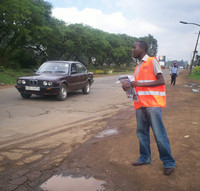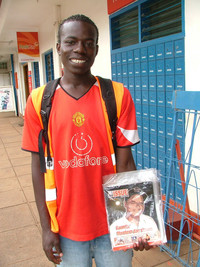Programs and Activities
Programs and Activities
News and Information
The core activity of Ghetto Reporters is reporting the daily happenings in the informal settlements. The group, which is composed of trained -young journalists collect news items in the slums and present them to their partner media houses while they publish others in the website.
The news items, which include features, daily news, statistics and documentary, are well researched and edited by members of the group.
The news and information are weekly. The members gather and edit the weekly stories from the various slums which they represent and then send to local medial stations and also publish to the website too.
Currently the group runs a fifteen-minute program at Radio Waumini, a Radio station under Waumini communications. The program (Slums Diary) goes on air every Monday at 9.30 P.M. It features weekly news from the different slum areas in Nairobi.

Event Organizing
Ghetto reporters in collaboration with partner organizations take responsibility of organizing community events such as conferences, campaigns, talent shows, peace forums, training among others all aimed at empowering the community youths.
This gives the community youth an opportunity to exploit their talent through participation in sport, arts and cultural activities.
Environment and Sanitation
Ghetto Reporters are on the front line to give back a sanitary image to the informal settlements. In collaboration with residents and other community based organizations, Ghetto reporters organize frequent community clean ups.
The group also organizes environmental campaigns with a keen eye on dumping and waste disposal.
Research and Consultancy
Ghetto Reporters members show deepest development as leaders. They have the richest community experiences and can devote their skills to Research Projects.
Research is a means of producing something of concrete benefit to client organizations. By exercising their research skills, Ghetto reporters help organizations better serve communities, and help communities solve the complex problems they face.

Through Research Services Ghetto Reporters use their research skills to produce projects of tangible benefit to the communities and collaborative organizations.
Research projects conform to the principles of community-rooted, collaborative, and reflective in terms of encouraged participation.
Ghetto Reporters engage their work fully in the community. They carry their Research projects in the form of;
- Documentary Photography.
- Oral History
- Surveys
- Qualitative research through interviews and focus groups.
- Documentation and Evaluation of projects.
- Community Resource-Mapping.
Ghetto reporters organize frequent research training sessions to sharpen their research skills.
Areas of focus include forced evictions, HIV/AIDS, Governance, Youth-focused poverty alleviation among others.
Ghetto Reporters explore avenues for research and submit draft research proposals to client organizations that provide feedback to the proposals.
They define the objectives of their Research activity in collaboration with their client organizations and collaborate with the organizations to carry out the projects.
Critical reflection is an integral component of the Research process. Throughout the year, Ghetto Reporters reflect on the progress of their Research projects. They examine the aspects of the work that are going well and those aspects that can be improved.
In addition, critical reflection is an important part of Ghetto Reporters final products.
Ghetto Reporters integrate the unique insights they have gained through the research process into their final products.
The goals of this program include

- To help slum communities develop their capacity through information and engage with complex issues;
- To be of service to innovative international organizations addressing humanitarian challenges;
- To help Ghetto Reporters develop research and critical reflection skills for exploring how policy issues relate to the lives of people around the world.

